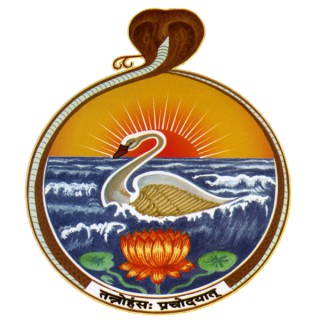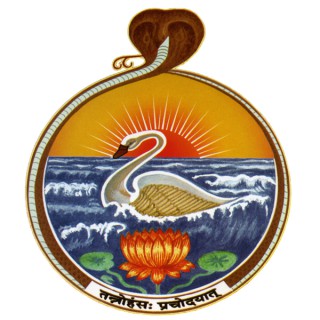Ishavasya Upanishad | ईशावास्योपनिषद
Follow Ishavasya Upanishad | ईशावास्योपनिषदThe Speaker's Introduction: Swami Tattwamayananda, currently the Minister of the Vedanta Society of Northern California, San Francisco, (originally founded by Swami Vivekananda in 1900) served in various centers of the Ramakrishna Order in India as editor, publisher, and teacher of Sanskrit, Advaiti…
Vedanta Society, San Francisco
- Apr 10, 2019 LATEST EPISODE
- infrequent NEW EPISODES
- 59m AVG DURATION
- 9 EPISODES
More podcasts from Vedanta Society, San Francisco
Latest episodes from Ishavasya Upanishad | ईशावास्योपनिषद

9 - Problem of Confronting and Transcending Death in Vedanta | Swami Tattwamayananda
Questions and Answers on Ishavasya Upanishad Mantras 1- 18. This lecture was given by Swami Tattwamayananda on April 6, 2012. -Story of King Parikshit from the Bhagavata Purana -Story of Nachiketa asking for three boons (from Kathopanishad)-Shankaracharya's two definitions of the word 'Purusha' -Importance of Shankara's commentaries for understanding the philosophy of Upanishads - विवर्तवाद (Vivarta-vada) & परिणामवाद (Parinama-vada)

8 - "Oh Mind, Dwell on the Good Deeds from My Past!" | Swami Tattwamayananda
Ishavasya Upanishad Mantras 16 - 18. This lecture was given by Swami Tattwamayananda on March 30, 2012. -These three mantras are prayers uttered by the spiritual aspirant at the time of death. -The devotee prays to be taken by the उत्तरायण (Uttaraayana), the Northern Path, also called the देवयान (Devayaana) or अर्चिरादिमार्ग (Archiraadi-maarga). -He has lived a life of fulfillment seeking higher spiritual values. -Description of three different eschatological points of view in Vedanta.

7 - Unity and Oneness of All Existence: Being and Becoming Are Essentially the Same | Swami Tattwamayananda
Ishavasya Upanishad Mantras 12 - 15. This lecture was given by Swami Tattwamayananda on March 23, 2012. -Being (Brahman: असम्भूति (asambhuti) and Becoming (the world: सम्भूति (sambhuti) are essentially the same. -Commentators like Uvvatacharya insist that असम्भूति (asambhuti) refers to certain schools of ancient Indian philosophers who reject the doctrine of rebirth (ie. Lokayatikas: materialists). -The devotee's prayer for spiritual fulfillment and divine revelation.

6 - Vidya: Going Beyond Death - Path to Immortality | Swami Tattwamayananda
Ishavasya Upanishad Mantras 9 - 12. This lecture was given by Swami Tattwamayananda on March 16, 2012. -The fate of those who follow the path of the not-self will be continuous rotation in the wheel of samsara (constant movement from birth to death and from death to birth). -They miss their path to the Vedantic experience of Unity of experience and ultimate spiritual fulfillment.

5 - Nature of the Reality and the Quest for Experience | Swami Tattwamayananda
Ishavasya Upanishad Mantras 8 - 11. This lecture was given by Swami Tattwamayananda on March 9, 2012. The quest for enlightenment in Vedanta through Philosophy, Reason and Experience.

4 - Indian Philosophy: 12 Schools (Orthodox- आस्तिक & Heterodox- नास्तिक) - Creationism and Vedanta | Swami Tattwamayananda
Ishavasya Upanishad Mantras 6 - 8. This lecture was given by Swami Tattwamayananda on March 2, 2012. - सत्कर्यवाद (Satkaryavada) and असत्कर्यवाद (Asatkaryavada) and their sub-divisions are explained with examples.-The mystical experience of the Unity and Oneness of creation helps us to look upon everyone with respect and compassion. -These mantras proclaim the spiritual unity and oneness of not only humanity, but all existence. -'Purusha' is explained in the light of पुरुशसुक्तम् (Purusha-suktam).

3 - Our Understanding of God Depends Upon Our Mind and Spiritual Growth. | Swami Tattwamayananda
Ishavasya Upanishad Mantras 3 – 5. This lecture was given by Swami Tattwamayananda on February 17, 2012. -Tyranny of the senses -Three levels of our spiritual evolution are explained in the light of 'Nimi-Navayogi-Samvaada (dialogue between nine sages and the philosopher-king 'Nimi') from the Bhagavata Purana: evolution from 'God within the temple/place of worship' to 'God present everywhere'. -The Atman is beyond definition and explanation. It is infinite transcendental and immanent - beyond time and space.

2 – Those Who Deny Their Own Divine Nature/Spiritual Identity Commit Spiritual Suicide. | Swami Tattwamayananda
Ishavasya Upanishad Mantras 3 – 4. This lecture was given by Swami Tattwamayananda on February 10, 2012. -The third mantra tells us that those who deny their own spiritual essence are spiritually destroying themselves. They reduce everything to the physical and are addicted to trivial sensual pleasures. They live in a world of perpetual spiritual darkness and sorrow. -The five mantras beginning with the fourth expound the nature of the Atman as the infinite, eternal, unchanging and all-pervading Self of all.

1 - Shrutis (Vedas), Smritis and Puranas: The Central Canonical Works of Hinduism | Swami Tattwamayananda
Ishavasya Upanishad Mantras 1 – 2. This lecture was given by Swami Tattwamayananda on February 3, 2012. -The central foundational canons of Hinduism are the Shrutis (Vedas), Smritis (religious manuals, texts of Vedic rules and laws on social conduct, etc.) and Puranas (semi-historical and mythological works).-The world is pervaded by ईश ('Isha'), the divine spirit of God, the Inner Essence and Controller of the universe. It is everywhere in this changing universe. -The 1st mantra expounds the Upanishadic vision of the spiritual oneness of existence. -The 2nd mantra is the essence of Karma-yoga taught in the Bhagavad Gita. It reconciles action and contemplation, realism and idealism, Jnana and Karma. It harmonizes spiritual and secular values, renunciation and enjoyment: the ideal of spiritual pragmatism.

















